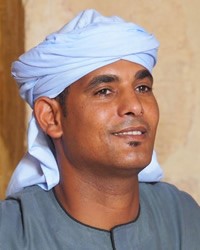Arab, Arabic Gulf Spoken in Egypt

Photo Source:
Hella Nijssen - Pixabay
|
Send Joshua Project a map of this people group.
|
| People Name: | Arab, Arabic Gulf Spoken |
| Country: | Egypt |
| 10/40 Window: | Yes |
| Population: | 1,820,000 |
| World Population: | 7,562,600 |
| Primary Language: | Arabic, Gulf |
| Primary Religion: | Islam |
| Christian Adherents: | 1.10 % |
| Evangelicals: | 0.00 % |
| Scripture: | Portions |
| Ministry Resources: | Yes |
| Jesus Film: | Yes |
| Audio Recordings: | Yes |
| People Cluster: | Arab, Arabian |
| Affinity Bloc: | Arab World |
| Progress Level: |
|
Introduction / History
The Arab culture was developed by tribes of nomads and villagers who lived in the Arabian Desert. It was from there that Arab migrations throughout the Middle East and northern Africa began, leading to the expansion of the Arab world. Today, the region is home to a number of different types of Arabs. The Gulf Arab (also known as the Saudi Arabs) live primarily along the southern edges of the Arabian Desert, though some have migrated to other Arabic-speaking countries like Egypt. They speak Arabiya, or, as it is more commonly known, Gulf Arabic.
Egypt began her process of Arabization when Arab armies started to conquer this land in the 600s. The Egyptians speak Arabic, but their form of the language is much more prevalent than that of the Gulf Arabs, since Arabic media is usually based in Egypt. Saudi Arabia is the religious center of the Arab world, but Egypt is the cultural center. Today the Gulf Arab states are helping to prop up the Egyptian economy.
Where Are they Located?
Gulf Arabs gravitate to Egypt's urban centers like Cairo where there are jobs and night life.
What Are Their Lives Like?
Gulf Arabs in Egypt are usually from Saudi Arabia, a strict Islamic state. Alcohol and loose sexual behavior are not allowed in Saudi Arabia, so they go to places like Egypt to indulge in these self-destructive activities. The Gulf Arabs are much wealthier than the Egyptians. So the Egyptians love their money, but despise these people who come to their land with corrupt behavior.
In accordance with their Muslim religion, Gulf Arab marriages, even those in Egypt, are typically endogamous, which means that they only marry within a small social circle. A Gulf Arab is more likely to have a woman come marry him in Egypt than marry an Egyptian woman. Inheritance is patrilineal—passed down from fathers to their sons.
What Are Their Beliefs?
Half of the Gulf Arab are Shafi 'ite Muslim; many are Hanbalite (Wahhabite) Muslim; and the rest are Malikite Muslim. All three of these are part of the larger Sunni Muslim sector, also favored by most Egyptian Arabs. As Muslims, they follow the teachings of the prophet Mohammed. On the surface they try to appear pious, but when given the chance, they will sometimes indulge in behaviors that Mohammed would not approve of. Many live as if they can hide their sin from Allah.
What Are Their Needs?
For the Gulf Arab wherever they live, a profession of faith in Jesus may cost a person his family, his honor, his job, or even his life. Evangelization of this people group will be challenging due to the nature of the Arabs' lifestyle and belief system. Prayer is the key to reaching them with the gospel.
Prayer Points
Ask God to raise up faithful prayer teams who will begin breaking up the soil through worship and intercession.
Ask the Lord of the harvest to open the doors of Egypt to the preaching of the gospel.
Ask the Holy Spirit to call people who are willing to go and share the love of Christ with the Gulf Arabs in Egypt.
Pray that strong local churches will be raised up among the Gulf Arabs in Egypt.